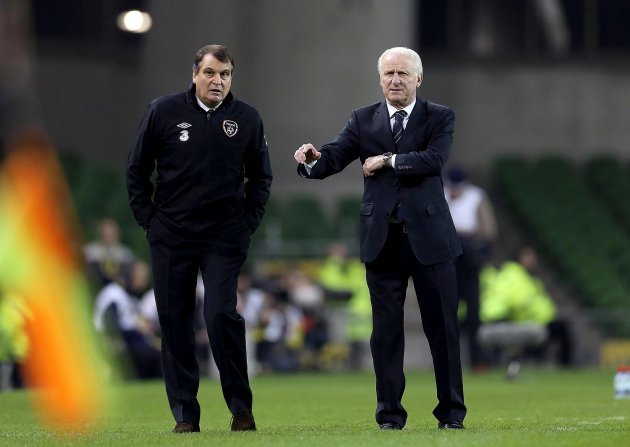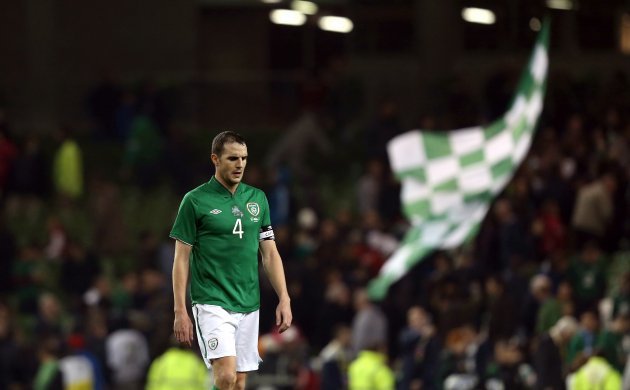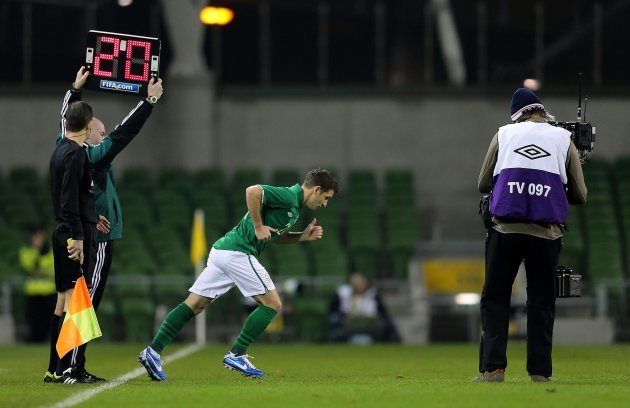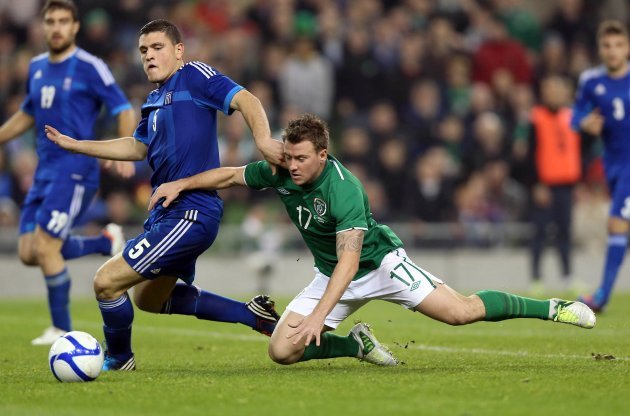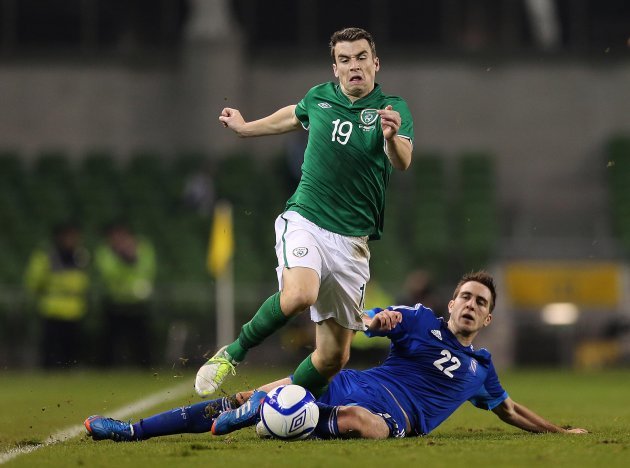1. Trapattoni shows further willingness to change (sort of)
(Ireland manager Giovanni Trapattoni and assistant manager Marco Tardelli – INPHO/Lorraine O’Sullivan)
Following the hints of encouragement in the recent defeat of the Faroes, there were more signs that the Ireland boss was willing to deviate from his old habits last night. As was the case in the recent World Cup qualifier, Ireland looked like a team who were encouraged to pass the ball, and Seamus Coleman surely gave the most attacking-minded performance that a full-back has ever produced for Ireland under Trap.
On the other hand, there were still several recognisable flaws – possession being conceded cheaply on a regular basis, a lack of urgency in Ireland’s play at times, substitutions that will have disappointed the majority of Irish fans (taking off Long instead of Cox, for example).
So are the pros or cons a truer reflection on Trapattoni’s future intentions as Ireland boss? It’s difficult to ascertain based on a single friendly match of course, but it seems as if Trap and the Irish team in general, are trying to adopt a more positive approach based on last night’s evidence.
Yet as with all rebuilding processes, much work will need to be done before this ostensible transformation comes to fruition – last night represented the first tentative steps of the drastic change that will hopefully occur gradually.
2. Some of Trapattoni’s reservations about certain players have been vindicated to an extent
(Ireland’s John O’Shea dejected after the game – INPHO/James Crombie)
If recent evidence is anything to go by, then Trapattoni was clearly wrong about ignoring players such as Wes Hoolahan and Seamus Coleman for so long. However, other selections that large sections of the media and fans had proposed are turning out to be less successful.
Moving John O’Shea to the centre of defence was widely considered to be the logical decision in light of Richard Dunne’s absence, and many even proposed that he remain there once Dunne returns, at the expense of the solid but unspectacular Sean St Ledger. Nonetheless, O’Shea has thus far failed to bring the experience and assured presence that many hoped he would provide in the role, and he was patently at fault for Greece’s goal last night.
Moreover, James McClean is another player who has so far been unable to meet the lofty expectations placed on his shoulder. Trap’s decision not to play him at the Euros seems wiser now. He demonstrated his immaturity in the Tweet-gate incident after the Kazakhstan match, and again there were flashes of his hot-headed nature amid little productivity last night. McClean let himself be provoked by an opposition player’s taunts at one point, causing friction between the sides and having to be dragged away from the controversy by a teammate.
Similarly, Ciaran Clark, despite impressing initially, was lucky to avoid being sent off for an extremely rash challenge on an opponent. Thus, while Trap’s failure to experiment sooner with certain players remains inexplicable, his references to others’ inexperience at international level occasionally rang true last night.
3. The Irish team is good enough to play possession football against top European sides
(Ireland improved following the introduction of Wes Hoolahan in the second half – INPHO/Lorraine O’Sullivan)
Ireland showed last night that they do have the players to play the type of possession football that many critics claim they are incapable of adopting.
Granted, Trap’s side were hardly beautiful to watch at any point, but the fact that they were willing to acquire a more positive mentality was cause for encouragement at the very least.
Ironically, while Ireland are often rewarded with a positive outcome despite producing a poor performance, in this instance, the opposite was the case.
Nevertheless, it should not be overlooked that the side were better than Greece, a Euro 2012 quarter-finalist, tellingly trumping them in the possession stats for large sections of the encounter, not to mention their being denied at least one clear-cut penalty.
In addition, factor in the significant amount of Irish absentees due to injury, and there is some scope for optimism ahead of the increasingly daunting-looking trip to Sweden next March.
4. Simon Cox is running out of chances to prove himself
(Ireland’s Simon Cox and Kyriakos Papadopuolos of Greece – INPHO/Donall Farmer)
The striker has been in fine form for Nottingham Forest recently, yet it unfortunately wasn’t reflected in his performance last night.
Cox missed a golden opportunity from a close-range header in the first half, and was too hesitant when played through by Andrews in the second period.
Given that his reputation at club level is hardly glowing in comparison to some of Ireland’s other attacking options, Cox can consider himself somewhat lucky to be in the team.
And when he starts ahead of a player as esteemed as Kevin Doyle, much is understandably expected of the former West Brom man.
Yet despite Trapattoni’s persistence in playing him, the striker has still yet to convincingly demonstrate what the Italian boss sees in him.
5. Seamus Coleman is now the only legitimate option at right back for Ireland
(Ireland’s Seamus Coleman and Kostas Fortounis of Greece – INPHO/Lorraine O’Sullivan)
Seamus Coleman’s recent two performances have been so impressive that it’s not fanciful to portray him as a metaphor for the small beacon of hope that the more optimistic Irish fans hold, with regard to World Cup qualification.
He is also the best illustration of the folly of Trapattoni’s style and selection policy, prior to recent games.
Before Coleman, Irish full-backs were notoriously reluctant to go beyond the halfway line, yet against the Faroes and again last night – in a sudden, drastic shift in circumstances – the Everton man was his side’s most potent attacking threat.
Therefore, in light of his past two performances, Coleman would undoubtedly be an automatic starter in the team from here on in, under almost any international manager. Yet, with the innately cautious Trap in charge, his position in the side is by no means guaranteed.
Would it really be that much of a shock, for instance, to ultimately see O’Shea preferred to him at right-back come crunch time in March?
